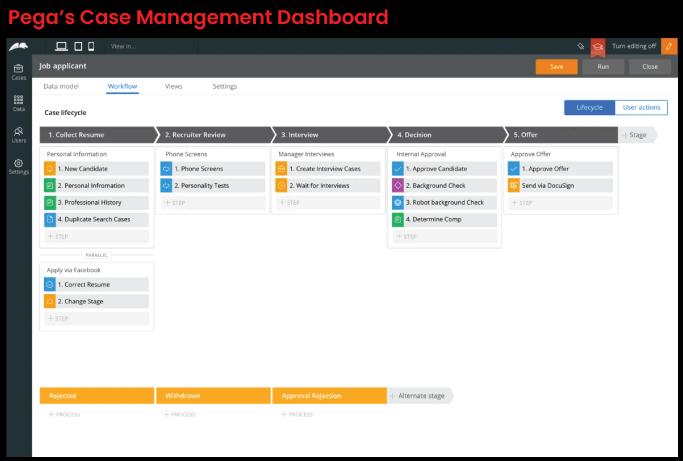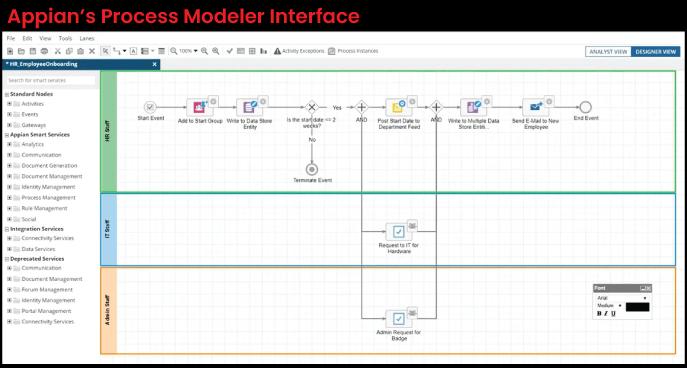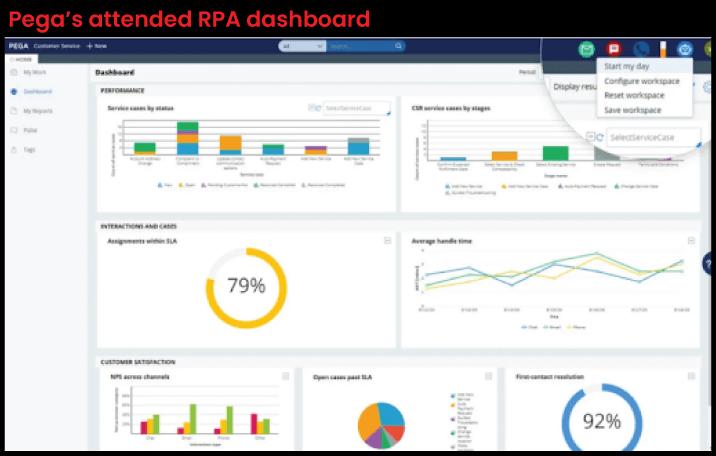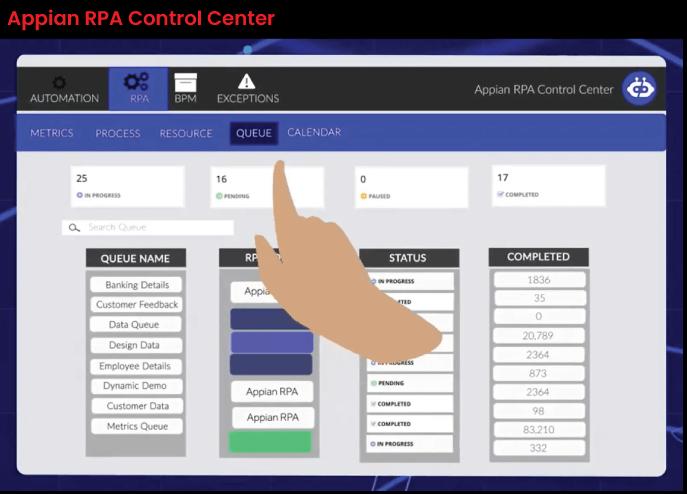Organizations operating in the present era don’t have the liberty to depend upon rigid, outdated, and ill-fitted business processes. For this specific reason, dedicated automation tools and business process management have been acquiring a lot of attention across industries. By depending upon a business process management consulting, companies get to integrate such instruments that help them define, develop and alter operations while keeping them updated and effective.
So, if you’re looking for a BPM solution, you’ll know that two major platforms – Appian and Pega – are dominating the market. They are renowned and considerable leaders in the automation software and business process management industry.
Despite competing tough, Pega and Appian aren’t similar. This post highlights everything about Pega vs Appian and helps you make an informed decision.
- What is Pega?
- What is Appian?
- What is Pega Used For?
- What is Appian Used For?
- Pros and Cons
- Comparison
- Business Process Automation and Case Management
- Intelligent Automation
- Setup and Pricing
- Low Code Application Development
- User Resources and Training
What is Pega?
Pega appears to be a Java-based business process approach that is utilized in the creation and deployment of apps. Pega is the dominant company and platform in the market for business process management technologies, greatly beating its competitors. Pega makes web-based implementations easy to design and administer. Pega comes with all of the necessary components for a web-based solution, including external systems and databases. Pega also has a crucial Software Quality Assurance solution. In comparison to Java, it has been shown that constructing a Pega implementation involves only one effort.
| If you want to enrich your career and become a professional in Pega, then enroll in "Pega Training". This course will help you to achieve excellence in this domain. |
What is Appian?
Appian is the only global leader in low-code app development, digital process automation (DPA), intelligent business process management systems (iBPMS), and dynamic case management (DCM). Appian is an all-in-one change management platform. The Appian Low-Code Platform is a unified low-code platform that incorporates the core capabilities needed to get work done faster: Process Mining, Workflow, and Automation.
What is Pega Used For?
PEGA is a famous Business Process Management (BPM) tool based on Java ideas that allow consumers to make improvements faster than Java-based applications. PEGA is mainly used to minimize expenses and enhance business outcomes.
What is Appian Used For?
Appian is a low-code development framework for all types of businesses. It enables customers to create BPM apps (business process management). Case management, business process management, three-step app development, and application integration are all key aspects.
| Looking for Best Appian Online Training Platfrom in Hyderabad? To Enroll a Free Demo Click Here. |
Pros and Cons of Pega
Pros:
- The unified architecture of Pegasystems, which is built on a robust business rule management system (BRMS) and predictive analytics decision management engine, is the company's main strength. Flow process concepts, rule handling, data processing, cross-platform UIs, a comprehensive mobile app development framework, BAM, content marketing, case management, application integration, and other functions are all integrated into one model-based development and runtime architecture that supports both structured and unstructured process styles.
- Pegasystems dedication to moving into the midmarket is demonstrated by two recent moves. The price-conscious midmarket will be served by a dedicated salesforce and new solutions. Pegasystems bought OpenSpan, a desktop interaction discovery, and Robotic Process Automation (RPA) technology, in 2016 to give midmarket buyers a noninvasive option.
- CEP, organization's decision management, predictive analytics, and IoT integration were included in Pega 7. Its "data pages" component is a configurable data structure that performs as a contextual broker, enhancing process instance data with contextually relevant data from outside the iBPMS.
Cons:
- Even though Pega Express helps numerous consumers in lowering their learning curve, companies that would like to use all of the characteristics of the Pega 7 platform should pursue Pega's solution development approach, which also contains education and training and changing the positions of business people, analysts, and IT staff members. Despite the fact that Pegasystems continues to hire consultants, form partnerships with third-party integrators, and increase the reach of Pega Academy, client references continue to cite problems finding enough Pega 7 experts.
- Pega's Strategic Apps, Cobrowse, and OpenSpan products are appealing to midmarket clients, but the business isn't promoting Pega 7 and Pega Express as standalone iBPMS platforms.
- Additionally, user references surveyed by Gartner, which were larger businesses — indicated a low degree of satisfaction with the product's cost-to-value ratio.
Pros and Cons of Appian
Pros:
- All six use cases assessed for this Magic Quadrant have excellent support from Appian. Appian's social centricity allows for rapid invention and discovery, as well as impromptu and ad hoc collaboration amongst customers, employees, partners, and suppliers. Appian Records' ad hoc data integration feature is simple to use. Records can be accessed through the social interface, and it acts as a context broker, allowing for situationally adaptable action.
- When compared to other vendors surveyed, Appian customers expressed a higher level of satisfaction with the platform. Appian's reputation as a business-friendly iBPMS is bolstered by this finding. Appian projects are agile, according to an additional study of client reference data. Customer references from Appian indicated that the average time to production was less than three months, the shortest of any vendor surveyed.
- Appian is the market leader in public cloud BPMS and iBPMS deployments, and it's one of the very few cloud platforms that really can handle business outcomes and also processes management between on-premises and cloud settings.
Cons:
- Appian employs a rule expression language that may prove difficult for citizen developers to grasp. To help with some of these issues, Appian provides a free, downloadable plug-in.
- Appian has less prebuilt adapters to IoT systems than other prominent iBPMS providers.
- Despite the fact that an elevated database provides for instant access to actual processes intelligence and active and on-demand analytics, the iBPMS lacks native CEP and analytics capabilities to support high-volume predictive analytics requiring extensive pattern matching.
Pega VS Appian - Comparison
| Pega | Appian | |
| BPA & Case Management | Case Lifecycle Management solution with visual BPM and proprietary Build for Change technology. | With an AI recommendation engine, it's possible to create a visual BPM tool. Decision Designer is a useful tool for making decisions. Toolkit for dynamic case management. |
| Intelligent Automation | AI-powered apps and proprietary RPA bots Intelligent automation development with Pega Process AI. | RPA, Robotic Workforce Manager, IDP models that have been pre-trained, and an AI app development kit. |
| Deployment & Pricing | Cloud services, both managed and unmanaged On-premise. | On-premises, public cloud. |
| Low-code App Development | Built-in DevOps capabilities in Pega's visual App Studio LCAD tool. | No-code connectors for databases and software, as well as a visual designer tool, AR/VR, IoT, and virtual assistant integration modules, as well as automated unit and UI testing. |
| Security Provisions | Security measures that are robust, 24/7 threat monitoring, and compliance with numerous security standards. | Multiple security levels, threat monitoring 24 hours a day, 7 days a week, Compliance with the most up-to-date security frameworks, and Third-party security audits are performed on a regular basis. |
| User Resources & Training | Pega Community Video Library is a knowledge base. Pega Academy is a virtual Pega community and training facility. | This is a resource center. Training programs are available both online and in person. Frequently occurring community events. |
Business Process Automation and Case Management
Pega
- Pega's BPM suite is built on the company's unique Build for Change technology, which allows users to completely avoid hand-coding throughout business operations. Business users may create bespoke apps with a consistent and intuitive UI using the platform's visual tool and simply adjust or grow them as their needs and requirements evolve.
- Meanwhile, the Case Lifecycle Management tool will aid in the orchestration of workflow for unexpected procedures, the automation of simple activities with bots, and the streamlining of decision-making using rules and AI.

| Check out Pega Business Process Management |
Appian
- Professional and citizen developers can quickly construct business processes design using Appian's robust BPM toolset. One may create process flow charts and integrate them into current business apps using a visual process modeller supplemented with an AI recommendation engine. Appian provides the Decision Designer tool, which is based on the open Decision Model and Notation (DMN) standard and comes with automatic coaching and quality control, to help developers create business logic for their apps.
- Appian's dynamic case management features are ideal for businesses looking to streamline unstructured, ad-hoc operations. The system assists workers who are dealing with incidents by automating simple processes and bringing together pertinent data from numerous sources to aid human decision-making.

Appian vs Pega: Intelligent Automation
Pega:
- Building attended and unattended bots, as well as a revolutionary auto-balancing function that redistributes bots to high-priority jobs, are among Pega's RPA features. Customers can also use unique RPA technologies like the NLP-powered Email Bot, X-Ray Vision, which allows bots to self-heal, and Workforce Intelligence, which allocates RPA bots to the most difficult tasks.
- The company currently provides a variety of pre-built AI-powered industrial automation, the most prominent of which include an intelligent virtual assistant for managing customer conversations and a Consumer decision Hub that anticipates customer needs and customizes conversations.
- Pega Process AI is a low-code development solution for computerizing consumer and information activities using technologies such as natural language processing, speech-to-text, event processing, and data visualisation.

Appian:
- Appian additionally permits for narrow-focus robotic process automation in addition to the holistic BPA development tools. Business customers can build cloud-native bots to do repeated high-volume tasks that use the graphical low-code development kit. Citizen developers can use Appian's out-of-the-box RPA components as a starting point for creating custom bots because they are Java-based. Companies can also download ready-made bots specialized in RPA use cases from Appian's community-driven AppMarket.
- Business customers can use the specialized Robotic Workforce Manager to monitor and manage their bots, as well as employ no-code connectors to integrate them with other enterprise applications to create completely automated workflows.
- Appian also provides pre-trained AI models for smart document processing, as well as a variety of out-of-the-box AI pieces for building smart and accessible business apps. Users can orchestrate operations between RPA and AI solutions to achieve hyper-automation using the platform.

Pega vs Appian: Setup and Pricing
Pega:
- The Pega platform provides excellent deployment flexibility thanks to its accessible, standardized architecture. It may be deployed on-premise on a variety of operating systems being used with a variety of popular app servers and databases. Pega can even be implemented in the cloud, where it could be maintained in consumer or partner-controlled setups, on Pegasystems' controlled cloud platform Pega Cloud, or as a PaaS on the Pivotal Cloud Foundry.
- Pega doesn't really offer a free version of their platform, unlike Appian. Instead, Pega Cloud gives a 30-day trial with access to only one tool, the low-code development App Studio. The Enterprise Starter edition, with per-user fees and various feature limits, is best suited for departmental efforts.
- Remember that several solutions at the Beginning and Transformational packs may be subject to higher expenses. Pega has a distinction for being an overpriced solution as a result of this pricing structure.
- Pega provides identity information and troubleshooting video, and also a contact page for reporting support cases, regional phone assistance, and the AI-powered Predictive Diagnostic Cloud, which monitors the platform's health and informs owners of important concerns.

Appian:
1. Appian is a PaaS platform with a cloud-native architecture that uses public cloud hosting partners such as AWS, Azure, and Google. Appian can also be installed on-premises; however, some security features will be unavailable in this case.
2. Appian offers four different platform options. There's the limited free version and the fully-featured Standard version, both of which have fixed monthly rates for different user kinds and weekday support. Then there are the Flat App and Enterprise editions, which are custom-quoted for departmental use and enterprise-wide installations, respectively. Both come with vendor assistance that is promised to be available 24 hours a day, seven days a week.
| Plans | Free Limited | Standard Fully Featured | Flat App Fully Featured | Enterprise Fully Featured |
| Price | Free | Standard: $60 USD Infrequent: $18 USD External Input: $2 USD per user/month | Custom quote priced per app | Custom quote priced per user with unlimited apps. |
| Users | N/A | Minimum 100 No Maximum | Minimum | Minimum 100 No Maximum |
3. For a limited time, companies can test-drive the Appian platform in its entirety for 14 days.
4. Finally, Appian offers free Android and iOS mobile apps that give users access to notifications, tasks, events, information, and collaboration while on the road.
Low-code Application Development
Pega:
- Pega's user-friendly App Studio also includes a variety of pre-built modules for creating fully featured, multi-experience, and mobile-friendly corporate apps. Aside from that, the application allows for quick user interface creation, data management, and connectivity with other enterprise software.
- Pega's App Factory, a solution for easily scaling low-code software, has built-in DevOps capabilities that allow developers to automate software testing and update distribution.

Appian:
For some years, Appian was a pioneer in the Gartner Magic Quadrants for low-code development and intelligent BPM software, and justifiably so:
- Business users can collaborate with IT experts with Appian's visual designer tool for creating business applications of almost any complexities with a modern UX/UI. Pre-built data connectivity frameworks and no-code information interfaces for datasets and major enterprise applications like SAP, Salesforce, AWS, and others are also available on the platform.
- Appian additionally provides automatic unit and UI tests and also a method for users to acquire insight into the application's user experience, infrastructures, and settings in order to sustain the software safe and functioning efficiently.
- Appian is a multi-experience low-code application development (LCAD) platform that enables users to create compelling enterprise solutions for desktop and mobile while building them. The platform offers pre-built components for generating AR/VR experiences, integrating Appian-based apps with IoT devices and wearables, and combining them with Amazon Alexa or Google Assistant to help companies take their software to the next level.

User Resources and Training
Pega:
- Pega additionally provides a comprehensive and easily accessible base of knowledge that contains documentation on all features and capabilities and industry-specific tools, as also deployment and maintenance instructions, update and patch release notes, and solved issue reports. Aside from the documentation, the Pega Community Video Library, which is updated regularly, contains product demos, troubleshooting how-tos, and talks with Pega professionals.
- Pega is characterized by an active virtual community known as Collaboration Center, which is controlled by customers who ask and answer questions and share their practical knowledge. On a constant schedule, the company hosts online gatherings and lectures on a huge array and industry-specific topics.
- Pega Academy now includes an increasing number of "missions," each dedicated to a specific skill set, such as low-code development, process design, and customer interaction optimization. Live classes with Pega's instructors are also available for free or for a fee. Pega certifications such as Business Architect, System Architect, Data Scientist, and Decisioning Consultant allow trainees to demonstrate their understanding of the company.
- Certifications are also a tool for Pega service providers to demonstrate their platform maturity and experience. Itransition received Pega certifications in 2020 and currently has qualified Business and System Architects on staff.
Appian:
- Business people can download a resource center on Appian's site for free, that covers reports, e-books, tutorials, and webinars on any and all things related to business process automation and administration using the platform.
- The company also provides personalized online and in-person training programs for analyst, developer, administrator, and architect jobs, as well as a certification program to verify learners' Appian understanding and expertise.
- Finally, Appian offers a diverse range of community events, including major gatherings such as the annual Appian World and regional or industry-specific summits and webinars.
Final Thoughts
Our Appian vs Pega comparison reveals that both have exceptional features, and are the market leaders in BPM software. However, both Appian and Pega are good options for a company looking to take advantage of business process automation benefits.
 On-Job Support Service
On-Job Support Service
Online Work Support for your on-job roles.

Our work-support plans provide precise options as per your project tasks. Whether you are a newbie or an experienced professional seeking assistance in completing project tasks, we are here with the following plans to meet your custom needs:
- Pay Per Hour
- Pay Per Week
- Monthly
| Name | Dates | |
|---|---|---|
| Pega Training | Feb 17 to Mar 04 | View Details |
| Pega Training | Feb 21 to Mar 08 | View Details |
| Pega Training | Feb 24 to Mar 11 | View Details |
| Pega Training | Feb 28 to Mar 15 | View Details |

Madhuri is a Senior Content Creator at MindMajix. She has written about a range of different topics on various technologies, which include, Splunk, Tensorflow, Selenium, and CEH. She spends most of her time researching on technology, and startups. Connect with her via LinkedIn and Twitter .













